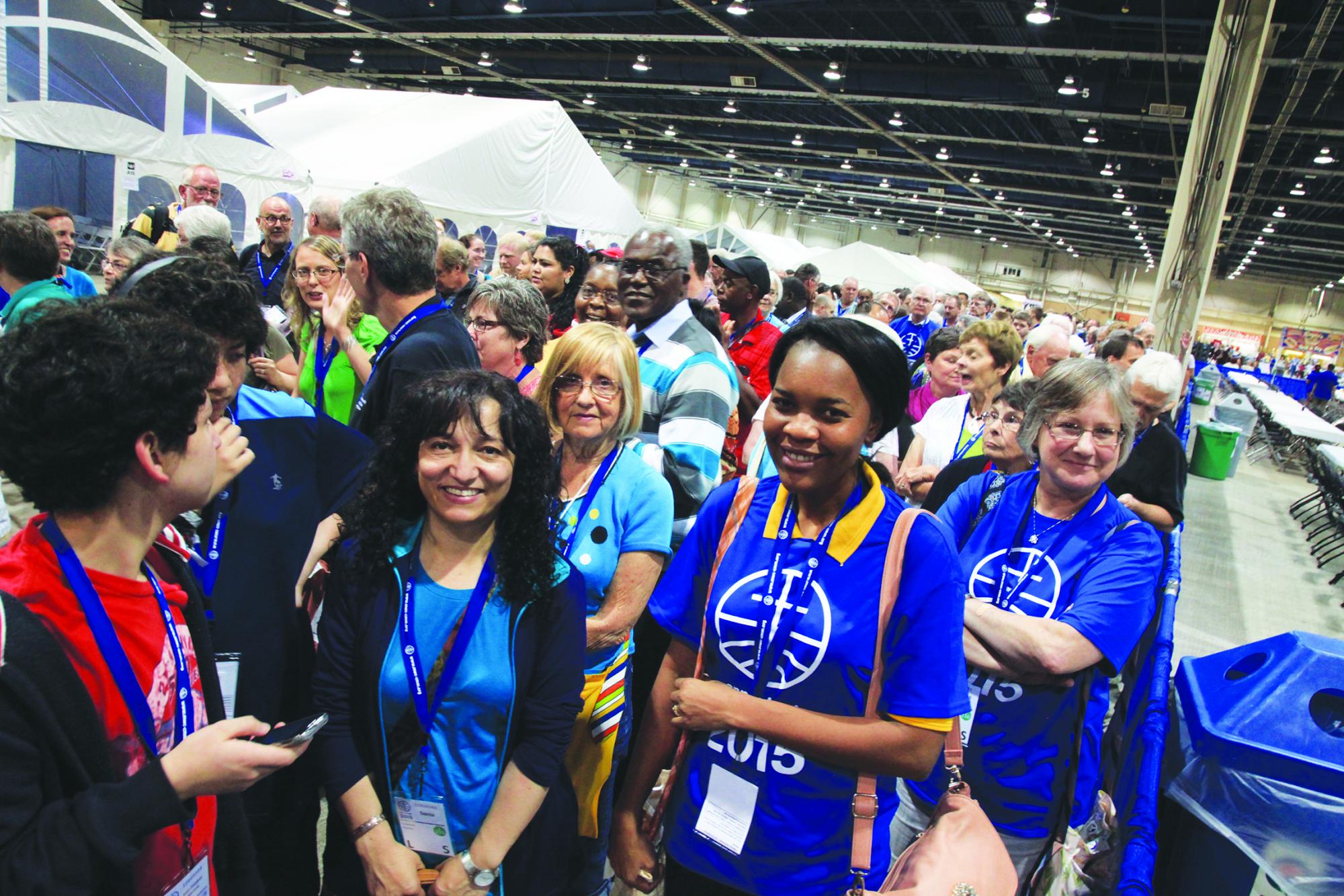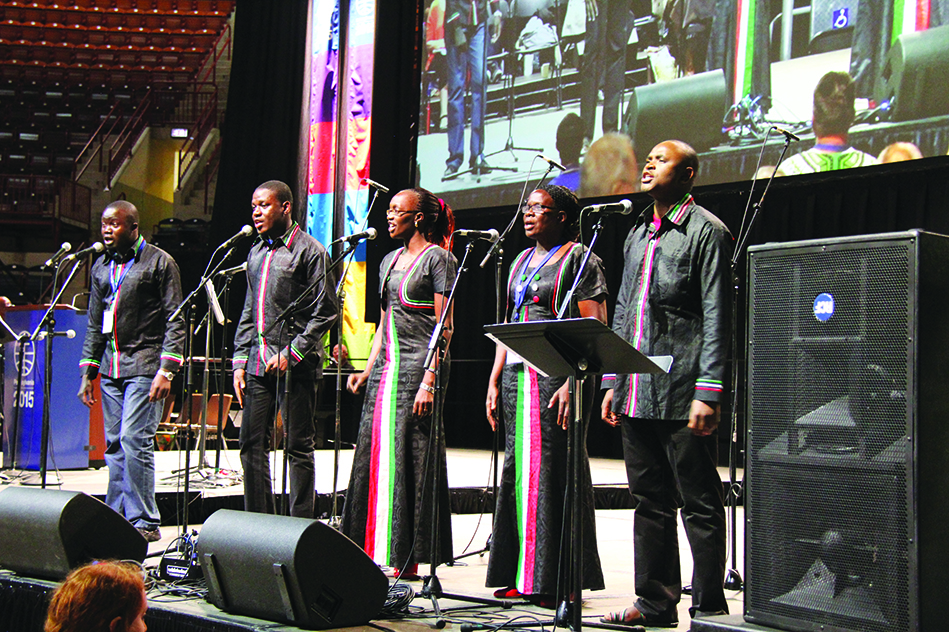Rebecca Osiro of Nairobi, Kenya, steps into her new role as vice president of Mennonite World Conference (MWC), with a life of experiences that has tested her faith and taught her wisdom.
Rebecca was the first woman to be ordained in the Kenya Mennonite Church (in August 2008), but her interest in the church stretches back to her childhood.
Her father was a Mennonite church leader, and Rebecca remembers helping to carry food to fellowship events and going with him as he visited church members and neighbours. “The dominant church was Anglican, but many of the families in our area were unable to pay their tithes to the church. So when there was a death in those families, the church wouldn’t do the funeral.
“Because my dad visited widely, offering pastoral care, the families often asked him to have the service and burial. I liked going along, comforting, singing and making strong tea.
“The simplicity of visiting, of listening, of being welcoming and open drew people to our church. And it drew me. When I was in my third and fourth years of high school, I’d spend Saturday afternoons doing evangelism out in the open and fellowshipping with all who came.”
Rebecca’s mother made a special point of introducing her to the Bible and the songs of the church. Why she got that kind of attention from her mother still mystifies Rebecca.
“I was her third daughter, and not the last of her 10 children. But she told me she gave me to God as her tithe before I was born. When I learned to read, she gave me a Bible. She’d tell me a Bible story as we worked together, or she’d suggest a passage or verse for me to read. Then she’d come up with a hymn that fit. In that way, she integrated me – and my siblings – into the church.”
Rebecca may have had strong coaching from both parents, but when she was ready to get married, she insisted on independence. “Matchmaking was the order of the day, often by an aunt. But I chose my own spouse. His church and mine often competed informally in singing and fundraising!”
Rebecca and Joash J. Osiro were married in 1981. They are the parents of five grown children. Joash is a bishop in the Kenya Mennonite Church (KMC).
To be ordained, or not?
Rebecca did not crusade to be ordained. But the matter of women’s ordination had been on her mind for quite a while.
“As I was growing up, I saw women standing strong. They would say to my dad, ‘We need a church.’ A church would begin, and soon it was time for a leader, so they’d look for a man. They’d ordain someone who didn’t have a vision – and the church would die!
“When I was still in high school, I’d ask my dad, ‘What does the Mennonite church say about women being pastors?’
“My dad always supported the ordination of women and was the first bishop in Kenya to ordain a woman (in 1994), amid great controversy. Fortunately he lived to see me be ordained when I was 49 years old. I was so blessed to have his support.
“At one point, I thought maybe the idea of ordaining me should just be dropped because of all the stir it was creating. I didn’t feel the need of it strongly, but I knew it was important for other women who were also leaders to have their authority recognized.”
Today Rebecca pastors the Eastleigh Fellowship in Nairobi. “We have 40–70 attendees at our weekly services in a space owned by the KMC, which we may use from 10:00 a.m. to 2:00 p.m. on Sundays. The neighbourhood is lower-middle class, international and becoming somewhat gentrified. A strong majority are Muslim radicals.
“Our attendees are indigenous, and many work for the local merchants who often won’t let them have off to attend church functions.”
Solidarity through choir practice
Eastleigh Fellowship had prepared to send part of their group to PA 2015 as members of the KMC Choir, which was scheduled to perform at the event. But when only five from the entire choir were granted visas (including Rebecca and her son, but not her daughter), there was great disappointment.
“We had been meeting in our home to practice the music because we don’t have access to our church’s space outside of our worship hours. People would come straight from work, and some would spend the night with us because they had no other place to stay.
“Some women from our church were locked out of their homes by their husbands because choir practice ran late into the evening. But they wanted to participate because it’s only through singing that they get to express their solidarity with each other.
“So when we got the word that most of their visas had been denied, I first thought I should stay home to stand with them. But then I realized that when I had the opportunity, I should go.”
Work for peace
To contribute to the family’s livelihood, Rebecca lectures twice a week about Islam in a Jesuit seminary. She has an MA in Islamic Studies from Kenya’s St. Paul’s University and has participated in research related to the Sharia Debates organized by Bayreuth University.
Rebecca is involved too in helping survivors of female genital mutilation. “It’s a small organization, and we do our work in peace.” Because the practice is deeply rooted in tradition, the men who inflict the damage are often unprepared for the horror of the harm they do.
“When we meet with abusers who confess to having participated in this, they often say forthrightly that they will never do it again. We work quietly. We want to help them be restored, so we build relationships.”
“My life is full of failed plans!”
How does this woman manage her life with all of its responsibilities and demands?
“My life is full of failed plans!” Rebecca says as she laughs and throws her hands in the air. “We have a grandson who lives with us, and extended family are always in and out for varying lengths of time.”
MWC’s leaders stand in line to get their food!
Rebecca has been a member of MWC’s Faith and Life Commission, a position she will leave as she becomes vice president of the organization. She is convinced of the value and necessity of the global body.
“MWC’s genius is fellowship and networking. We share our stories. We come together and find that we are one.
“We find strength beyond class, beyond status. MWC gives me courage. I feel I’m in the right place. Here at the Assembly, when I see MWC leaders, pastors and other church leaders standing and waiting in line to get their meals along with everyone else, I am so touched. In many other settings, they’d be brought their food rather than needing to wait in a queue!
“When I go home and see women living in paper houses, often over sewage, and they make me strong tea (probably having borrowed money to buy the tea), I am deeply moved.
“Sometimes I feel weak. Am I really on the right track? But nothing that I am doing am I doing by myself.
“I remember my mother saying, ‘Love your enemies.’ I think that is something God is doing inside me. I am not perfect. I do get irritated.
“But I find that with time, people who have said hard things, who have been against things in the church that seem important, those harsh differences often are taken care of – or at least no longer seem to stand between us.”
This woman has much to bring to the leadership of Mennonite World Conference.
Phyllis Pellman Good is a writer and editor for Mennonite World Conference.
This article first appeared in Courier/Correo/Courrier October 2015
Servant leadership means waiting in line to register, for meals—an opportunity for fellowship, to
reconnect with old friends and meet new ones. Photo: Jonathan Charles
Only five members of Kenya Mennonite Choir were able to obtain visas to travel to the USA for PA 2015. Rebecca Osiro is second from right. Photo: Ray Dirks
Click on the photos to see the high resolution version.

